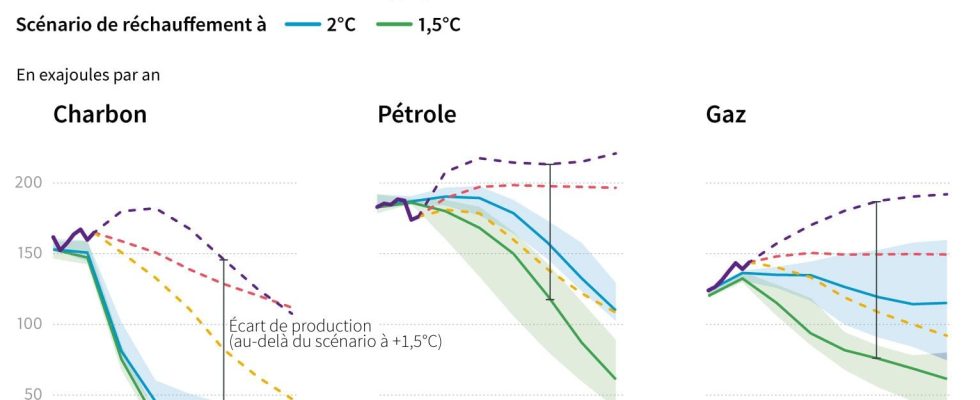On the eve of the planned end of COP28, UN Climate chief Simon Stiell called on countries to remove “unnecessary tactical blockages” in order to find an ambitious agreement. “We are now here to discuss two subjects,” he declared Monday, December 11, citing the reduction of greenhouse gas emissions and the “ways” of supporting the transition of less developed countries, while a new final text proposal is expected in the coming hours.
Will the end of oil and gas be mentioned in the final agreement?
In the Paris agreement, often described as the most ambitious text resulting from the climate summits, the words “oil”, “gas”, “coal” or “fossil energy” simply did not appear. In Glasgow, in 2021, the countries committed, after a long standoff, to reduce their coal consumption. This year, it is the exit from fossil fuels which is at the heart of the discussions. In Dubai, for the first time, 200 countries are trying to find an agreement on the exit or reduction of all fossil fuels.
At least 80 states, including European countries and the United States, are in favor of the eventual elimination of fossil fuels. For now, a likely agreement could mention “uncaptured” or “unmitigated energy”, that is to say the regulation of greenhouse gas emissions emitted by fossil fuels using capture techniques. CO₂. The exact nature of these techniques and their ability to effectively combat climate change are the subject of fierce debate.
Capturing polluting gases is currently far too expensive. If we equip all the world’s power plants with filters, the bill would amount to… 30,000 billion dollars, according to a study from the University of Oxford. An idea out of reach for the moment, but which could well make it possible to find a compromise between all the parties involved in the discussions. Several projects are on the table, more or less restrictive, and the negotiators will not leave each other before the end of the COP, Tuesday December 12, at 11 a.m.
What role will the least developed countries play?
“This COP, since it addresses the crucial issue of fossils, is mainly between the big players,” analyzes Li Shuo, formerly of Greenpeace China and now a climate specialist at the Asia Society Policy Institute, with the newspaper The world. The agreement will undoubtedly be between the United States, China, the European Union and the United Arab Emirates.”
But the question of funding allocated to developing countries, like India, which are having difficulty reducing their dependence on coal, gas and oil, will be crucial. António Guterres, Secretary General of the United Nations, proposed “the creation of a solidarity pact”, in order to help the most deprived countries to move away from fossil fuels and ensure that the objective of global warming is maintained. limited to 1.5°C compared to the pre-industrial era. France already announced, on December 6, a financial package of 173 million euros for the countries most vulnerable to climate change.
What are the main blockages?
OPEC, the union that brings together 23 of the largest oil-producing countries, has called on its members to firmly reject any text that would target fossil fuels. The organization warns that “unjustified and excessive pressure against fossil fuels could reach a tipping point with irreversible consequences.” Saudi Arabia is at the forefront of this fight and calls for its concerns to be taken into account since the final agreement must be adopted by consensus. According to Alden Meyer, of the E3G think tank, this is the first time that an OPEC secretary general has intervened in this way in climate discussions sponsored by the United Nations. “This shows a wave of panic,” he told AFP.
The voice of Beijing, around 60% of whose electricity production depends on coal, will also be decisive. Unanimously described as “constructive” behind the scenes, China nevertheless has several reservations, for example regarding the future carbon tax at the borders of the European Union, which would penalize its exports. A subject where she has the support of African or emerging countries, such as Brazil. During the negotiations, the Chinese envoys did not directly oppose a gradual exit from fossil fuels, but remained very attentive to ensuring that each country had great freedom over the pace.
